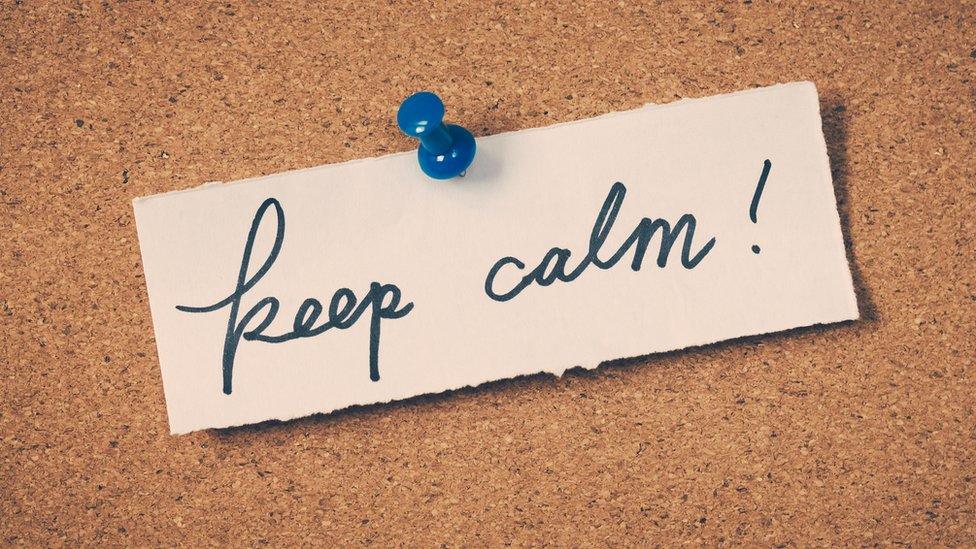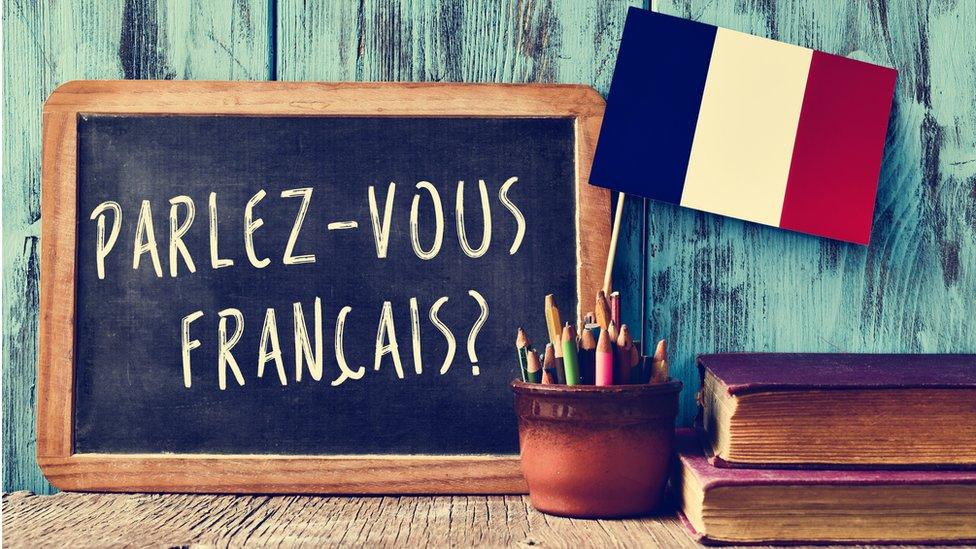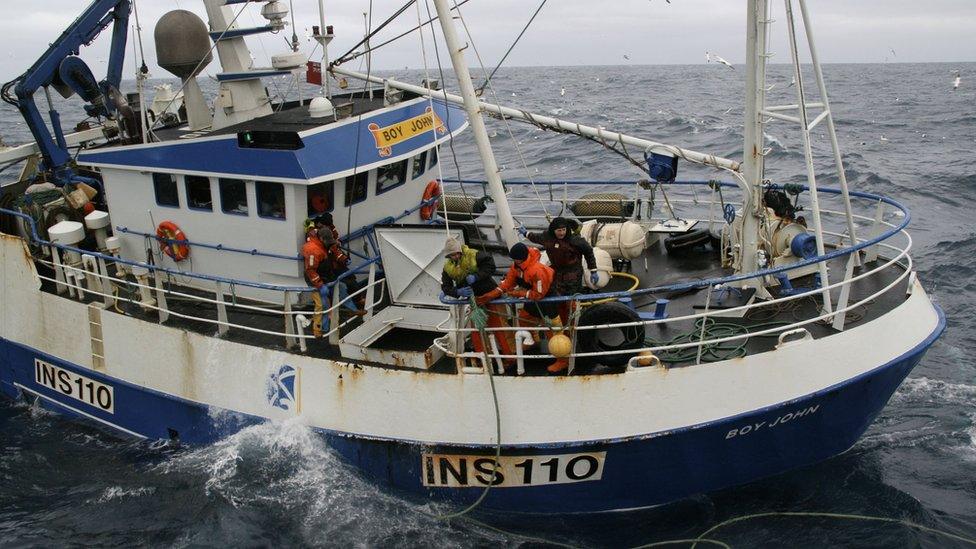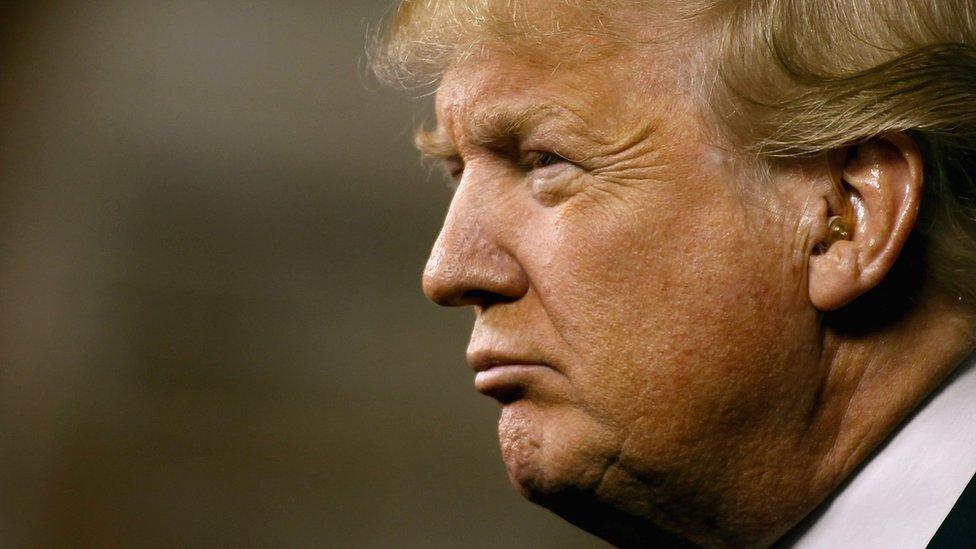Brexit: Keep Calm and Negotiate
- Published

"Keep calm and negotiate": a Frenchman's play on that most British of slogans.
The over-exposed "keep calm and carry on" poster was intended for distribution if Nazi troops invaded Britain during the Second World War.
Michel Barnier, lead negotiator for the other 27 member states in Brexit talks, used it cheekily this week as a challenge to the British from across the Channel. The gauntlet was being thrown down. "We are ready," he said.
The inference, of course, is that Britain is not ready for talks, and nor does it appear very calm. But getting to the point where France's former commissioner can claim to have 27 countries lined up behind him is not a simple process either.
And it will require further diplomatic skills to keep them together - particularly while the British seek division.
Barnier has set out the principles:
Unity of remaining EU members.
The UK won't have rights and benefits if it's not a member.
No negotiations before Article 50 notification.
The 'four freedoms' at the heart of the EU project are indivisible. "There will be no cherry picking".
Passporting
I've been to Brussels to hear how the other 27 foresee the talks, and how they're going to resolve their differences.
The lists of requirements, red lines, wish lists and priorities are lengthy.
The Germans will be key to any agreement. In the end it may come down to one room, one meeting, with Angela Merkel eyeballing Theresa May.
In Berlin, they want to keep markets open for their complex manufacturing supply chains and big UK markets. But as I noted earlier this week, that's not at the price of the single market principles.
Belgium is seen as the keeper of the EU flame - not only as the home of its government, but as a state that has fundamentally changed in order both to devolve to its regions and to acknowledge the ever closer union to which true believers aspire.
France sees opportunities, notably in finance, if the City of London is frozen out of passporting rights to operate across the Union.

I'm told Paris is also pushing to re-balance the EU's language policy away from English. Ireland will be the only EU country left where English is the first language.
But the French face opposition from others across the continent, and particularly in the east, who would prefer to use English.
Poland and its neighbours want to ensure free labour movement remains uncompromised by any deal with Britain.
Its Baltic neighbours have particular concerns about retaining Britain's commitment to defence and intelligence co-operation, post-Brexit.
Fishing armada
Spain is a particularly interesting case from a Scottish perspective. It won't let Brexit talks go by without a big effort to wrest Gibraltar from London rule, or to punish the Brits for keeping it.
Madrid wants to avoid any EU deal with parts of the UK, including Northern Ireland and Scotland, which could be used as a precedent for Basques and Catalans to press their demands for loosing the ties that bind.
Spain also wants to retain access to the UK's fishing waters.

And of course. it has become home to the largest group of British exiles, many of them retired. Their status will need to be clarified, as will their pension rights.
Will Spain get all those outcomes it wants? That is the question for Michel Barnier and his team. His job is to minimise the red line issues, when all 27 member states have a veto over the deal. And he has to force each government to prioritise, if they can't get everything they want.
This is not a new process. Finding common ground across member states is what the European Union is for.
Fabian Zuleeg, director of the European Policy Centre and an adviser on Brexit to the Scottish government, observes: "The EU has a lot of experience of these situations. This is similar to an accession negotiations or trade negotiating.
So what will happen is that the 27 will, in each domestic environment, come up with the demands, questions, the kind of red lines they have, and this will be given to the Commission to come up with one negotiating position for the whole EU.
"It will not be the 27 sitting across the table, but the Commission negotiating on behalf of all member states. And in the end, it will have to go back to ratification by the member states."
Zuleeg says fisheries will not just be a concern of the Spanish, but Norway and Iceland, from inside the European Economic Area but outside Union membership, may add their voices to the 27.
Talk of le steamie
"Everybody is keeping their powder dry," says SNP MEP Alyn Smith. "But it is the talk of the steamie.
"Countries don't have friends - they have interests. And the Danes, Irish, the Germans, the Swedes, the Dutch and the rest will all be looking after their interests, and quite rightly.
"But there is a sense of solidarity that the 27 will work together. Commissioner Barnier is uniting them around a series of points, such as: you can't leave and get a better deal, because what kind of club would that be?"
As an SNP MEP, Smith is pushing for Scotland to have a different deal, and for the other 27 to recognise that "Britain is not one thing but a complicated set of different things - Gibraltar, Northern Ireland, Scotland, the City of London".
Meanwhile, Ian Duncan, the sole Scottish Conservative in Brussels and Strasbourg, wants to see Scotland asserting its interest in Whitehall, to contribute to a common UK negotiating position.
While others see the 27 coalescing round a common agenda, the Scots Tory sees dividing lines opening up.
"I deal with fisheries, and you can tell there are certain states in the southern North Sea who depend on access to our waters. And they are very nervous.
"The last thing they want is to be excluded from British waters. If they don't get a deal, these boats are going to be tied to the quayside.
"There will be smaller groups within the 27, each wanting something slightly different," he says.
"There are little elements, groups, cabals, each requiring different elements. So a single suite of red lines is not likely to emerge."

The victory for Donald Trump in the US presidential race has changed the landscape, says Ian Duncan. Everyone is now very alert to the electoral threat posed by populists.
And, he argues, this is no time for the 27 to be flexing their economic muscle against Britain: "If we get it wrong, it won't just be the UK that suffers. The eurozone is far more fragile than many give it credit for. The banks in many countries, including Italy, are hanging by a thread.
"Any shock to the eurozone will cause untold threat to the continent. The stakes are high on both sides and the suggestion that one side holds all the cards doesn't hold water at all."
Hard Brexiteers
Senior Commission insiders reckon that Britain has long failed to understand the mindset of its EU partners. To many of them, this is not a mercantile club for easier trade. It is about securing peace, having fought each other many times.
"For new members in the east, democracy and liberty are required for EU membership and they are not abstract," one told me. "The European Union is seen as what keep their troops in the barracks."
In her sixties, Danuta Hubner has seen the generals take charge in her native Poland. She was the country's commissioner, with the trade portfolio, and she is now a centre right MEP, and chairwoman of the European Parliament's constitutional affairs committee.
Listening to her is as if the referendum campaign goes on, frustrated that she and others took advice not to travel to Britain to campaign and explain how Brexit might work.
"We could have brought more facts to the debate," says the economics professor. "Finally, a good discussion about what Europe is about will take place in the UK, and that is why we worry that the government is focused on making the Brexiteers pleased. I think that is unfair to the ordinary citizens of the UK."
The government seems focussed on the negative, on the leaving and on an approach which is represented by hard Brexiteers, which is a bit worrying for us. The hard Brexiteers are elderly, well established, rich people but we want to protect the citizens on both sides of the Channel - ordinary people, the students, the people who want to establish small companies and go to Europe."
She reflects: "Throughout history, you have been a difficult partner, always asking or exploiting the existing flexibility of the treaties, getting special solutions and having problems with the budgetary problems in particular."
And now, Danuta Hubner sees the UK trying to divide the 27: "If the UK doesn't divide us, it will be 27 united and well united, looking for win-win on both sides. So trying not to divide members would be good for the UK. That way, we can do this faster."